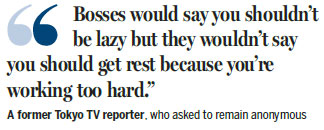Japan's media industry fatally flawed
TOKYO - The recent news that a young reporter at Japan's public broadcaster had worked herself to death came as little surprise to those inside the country's media, where a culture of excessively long hours is the norm.
"I thought it would happen eventually because we work like crazy ... like a slave," said a female journalist at one of Japan's major newspapers.
"I really thought I would die," she said on condition of anonymity, recalling her days chasing after the prime minister and lawmakers in Tokyo, when she would routinely come home from work at 1 am and wake up four hours later.
While journalists tend to work long hours in many countries, the situation in Japan is among the most extreme, with reporters expected to be on the job 24/7.

The newspaper journalist - now in her 30s - was one of a gang of hard-core Japanese reporters who stake out the houses of politicians they were assigned to follow every single night whether there is news or not - a ritual called Yomawari, meaning "night round".
Even on a snowy night, she used to wait hours outside the house of a politician she was covering.
"I had disposable hand warmers everywhere on my body but it was still too cold. I couldn't go to the bathroom. It's bad for your health," she said, adding that she's seen fellow journalists becoming physically and mentally ill.
A former Tokyo TV reporter pointed the finger at the Japanese culture of "fighting spirit", in which you're told to never give up no matter what.
'Like a zombie'
The 32-year-old, who was no stranger to working around the clock, remembers the day she kept going even though she felt seriously ill.
"I didn't have time even to check my body temperature. Later I realized I had a 39 C fever," she said.
"Bosses would say you shouldn't be lazy but they wouldn't say you should get rest because you're working too hard. "Then you become like a zombie. ... This has to stop."
The case of NHK reporter Miwa Sado, who died of heart failure aged 31 after logging 159 hours of overtime in the month before she died, made global headlines but was far from an isolated tragedy.
Every year in Japan, long working hours are blamed for dozens of deaths due to strokes, heart attacks and suicides. Death from overwork even has its own word in Japanese - karoshi.
According to a government report released last week, there were 191 karoshi cases in the year ending in March.
NHK journalist Sado, who had been covering Tokyo assembly elections and a vote for the national parliament, was found dead in her bed in July 2013, reportedly clutching her mobile phone.
Agence France-presse
(China Daily 10/14/2017 page8)














